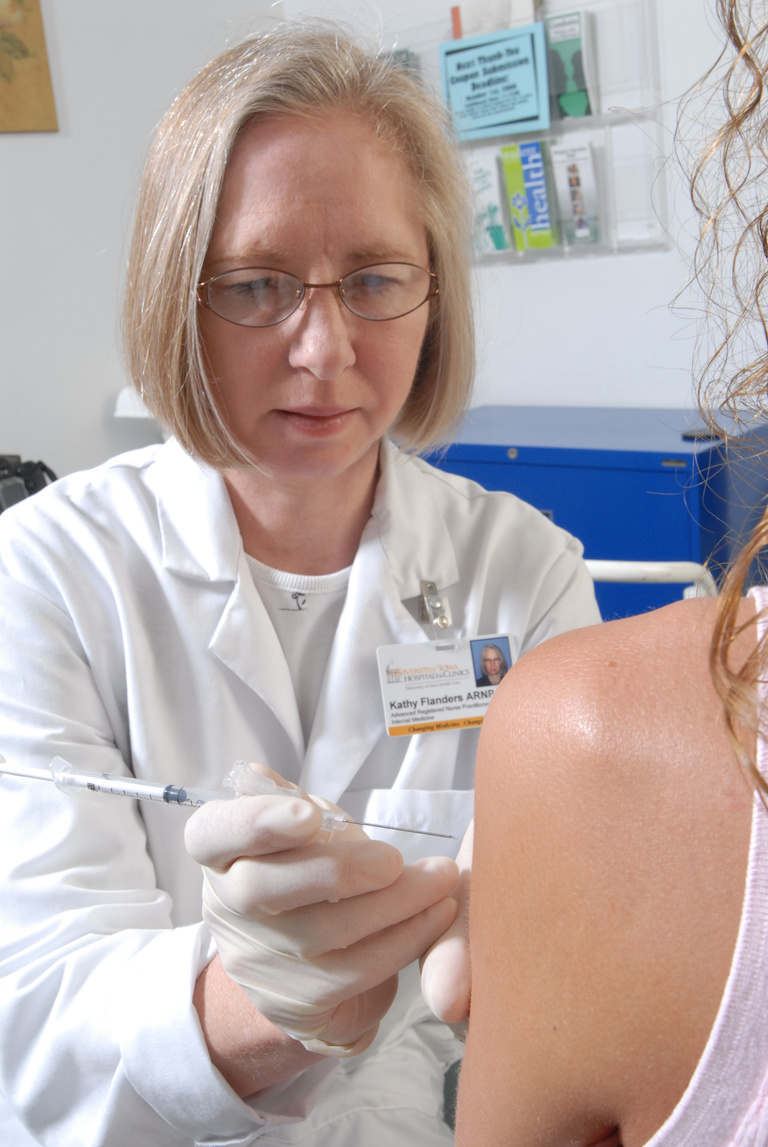
The University of Iowa is one of four institutions involved in a new clinical trial to evaluate a candidate H3N2v influenza vaccine in healthy adults and elderly individuals. The National Institute of Allergy and Infectious Diseases (NIAID), part of the National Institutes of Health (NIH), is funding and coordinating the trial. Baylor College of Medicine in Houston, Texas, is leading the study.
H3N2 influenza viruses typically circulate in pigs, but variants— denoted by the letter “v”—sometimes circulate in people. Since July 2011, there have been 321 confirmed cases of human infection with this H3N2v virus. Most of these infections have been associated with direct and prolonged exposure to pigs at agricultural fairs, although some person-to-person transmission has occurred. Symptoms of H3N2v infection are similar to those of seasonal influenza: fever and respiratory symptoms (such as cough and runny nose) that may be accompanied by body aches, nausea, vomiting, or diarrhea. This variant version of H3N2 influenza virus is similar to the H1N1 virus (swine flu) from 2009, but is not the same virus that is currently causing seasonal flu in the United States.
The H3N2v vaccine is being developed and tested because this virus seems to spread more easily from pigs to humans than other swine influenza viruses, and given the natural ability of influenza viruses to change and adapt, the concern is that the H3N2v virus could adapt to spread more easily among people.
The Phase II vaccine study aims to enroll up to 240 healthy adults between the four institutions. Study participants are placed in one of two groups depending on age: participants ages 18 to 64 years old in group one, and participants ages 65 and older in group two. Participants in both groups receive an injection of the H3N2v vaccine on their first day in the study and a second injection 21 days later. Pregnant women are not eligible for this study.
Participants provide five blood samples over 42 days, which are used to evaluate immune system responses to the vaccinations. Researchers also evaluate individual participant reactions at the injection site and monitor for adverse events and the development of new chronic medical conditions for up to seven months following the first injection.
Patricia Winokur, M.D., UI professor of internal medicine and director of the UI Vaccine Research and Education Project, is leading the UI portion of the clinical trial. The UI site has already recruited all its participants.
In addition to the UI and Baylor College of Medicine, the centers involved in the trial include Emory Vaccine Center’s Hope Clinic, Decatur, Ga. and the Group Health Research Institute in Seattle. All four participating institutions are home to an NIAID-funded Vaccine and Treatment Evaluation Units. The vaccine being tested was produced by Sanofi Pasteur, a pharmaceutical company based in Lyon, France.
If early information from this study indicates that the vaccine is safe, a similar clinical trial in healthy children ages 6 months to 7 years of age will begin.
Information about the clinical trial is available at ClinicalTrials.gov under the identifier NCT01746082. The study is one of many clinical trials currently underway at UI Hospitals and Clinics.